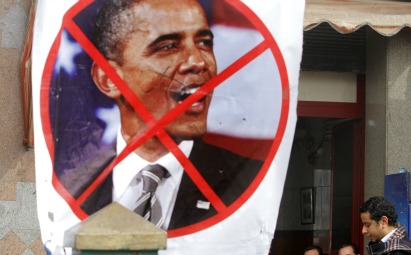By Journalist’s resources
Terrorism and mass shootings are a “critical issue” for the majority—75 percent—of Americans, according to a Public Religion Research Institute survey conducted after the December 2015 San Bernardino, Calif., killings by two Muslim extremists.
The mass shooting and other acts of targeted violence, particularly involving Muslim shooters, have prompted a debate about the roots of such violence and whether it stems from deep-seated enmity toward America. This has policy implications. Concern over anti-Americanism spiked after the September 11, 2001 terrorist attacks. Eleven days after the attacks, Pennsylvania Governor Tom Ridge was appointed as the first Director of the Office of Homeland Security in the White House. The office oversaw and coordinated a comprehensive national strategy to safeguard the country against terrorism and respond to any future attacks. More recently, presidential candidate Donald Trump made headlines in December 2015 when he called for a temporary ban on Muslims entering the U.S. and declared that “Islam hates us.”
Ironically, a 2003 report by the Pew Research Center states that–at that time–anti-American sentiment was on the rise not just in the Middle East but around the world, largely due to America’s invasion of Iraq. The numbers of people worldwide with a negative image of the United States “paint a depressing picture,” according to the report. In the 2002 survey of 38,000 people in 44 countries, Pew “found that the U.S. global image had slipped.” But in 2003, after the war in Iraq, Pew conducted another 16,000 interviews in 20 countries and the Palestinian Authority, and “it was clear that favorable opinions of the U.S. had plummeted.” A newer Pew survey, conducted 11 years later, shows that world opinion has shifted yet again: A 2014 survey of 44 nations shows “there is little evidence of profound anti-Americanism except in a handful of countries.”
The Pew findings suggest that peoples’ views of the U.S. are connected to policy: People don’t like America because of what America does rather than because of what it is.
Daniel Corstange, an assistant professor of political science at Columbia University, wanted to examine anti-Americanism in the Middle East to determine whether the dislike is based on U.S. government policy or if it extends to all things American, including culture and people. His 2016 study published in The Journal of Politics, “Anti-American Behavior in the Middle East: Evidence from a Field Experiment in Lebanon,” looks at anti-Americanism in the Arab Middle East and greater Muslim world. Corstange notes that most studies of mass anti-Americanism draw on public opinion data, which he says are influenced by sensitivity to the topic, cultural factors, measurement error and other factors. Corstange also looked at whether the hostility was specific to the United States or if it extended to other western countries as well.
Corstange conducted a field experiment in Lebanon that collected data from face-to face interviews with a random sample of Lebanese adults in the greater Beirut metropolitan area. Researchers contacted 2,592 households. They introduced themselves and the purpose of the visit but didn’t reveal the sponsor of the study. The purpose of the preliminary introduction was to gain access to the entire household. Of the total contacted, 96 percent of households permitted researchers to interview a household member. Researchers then revealed who was sponsoring the study. Control subjects were told only that a local firm was conducting a survey. Treatment subjects, in contrast, were told that the sponsor was from a list that included the American embassy, the Canadian embassy and American University in Beirut. Researchers later debriefed survey subjects and told them that deception was used to elicit responses.
His goal was to answer the question: would study subjects refuse to be interviewed based on who they thought was asking the questions?
Some key findings:
Rates of participation declined significantly when subjects were told that the survey sponsor was a government but not when it was a university. This pattern was the same across various communities regardless of their baseline level of hostility to the United States. The pattern also held across age, sex, education level and socioeconomic status of test subjects. The study author called these results “stark.”
Test subjects didn’t show any discomfort with academic survey sponsors, whether they were based locally in the Middle East, in the United States or in partnership with one another. This finding is inconsistent with generalized anti-Americanism: “even if people have policy-based grievances with the United States, the evidence suggests that they set them aside when interacting with academic institutions.”
The above two findings suggest widespread hostility to the U.S. government, but no evidence of generalized anti-Americanism.
The study found no evidence of generalized anti-Americanism, even where it should be easiest to detect, but strong evidence of policy-based hostility to the United States. This hostility extended to other governments as well, including Canada.
Anti-Americanism—defined as the phenomenon of “hating the country more than any other, and hating everything about it”—is much less pervasive than commonly supposed.
The findings suggest while people may be hostile to U.S. policy, the animosity doesn’t stop them from engaging with nongovernmental organizations, according to the study author. Therefore, “Middle East regional specialists, who have been arguing for years that people make this sort of distinction, can continue to work in the region without worrying they will be tainted with a “nationality-based, guilt-by-association” brush. Corstange also notes that the study “set a low bar for detecting anti-American sentiment: an interview request, which could easily be rejected by a study participant if he or she had even mild anti-American feelings. He concludes that, “if we cannot uncover evidence of generalized anti-Americanism in Lebanon—especially among its Shia population—we may be hard pressed to find it anywhere.” The study’s findings, he says, “suggest that anti-Americanism, as a generalized and particularized phenomenon, may be more chimerical than real.”
Related research: Findings from a 2015 study, “Anti-Americanism and Anti-Interventionism in Arabic Twitter Discourses,” reinforce “evidence from polling that anti-Americanism is pervasive and intense, but they also suggest that this animus is directed less toward American society than toward the impingement of the United States on other countries.”



















